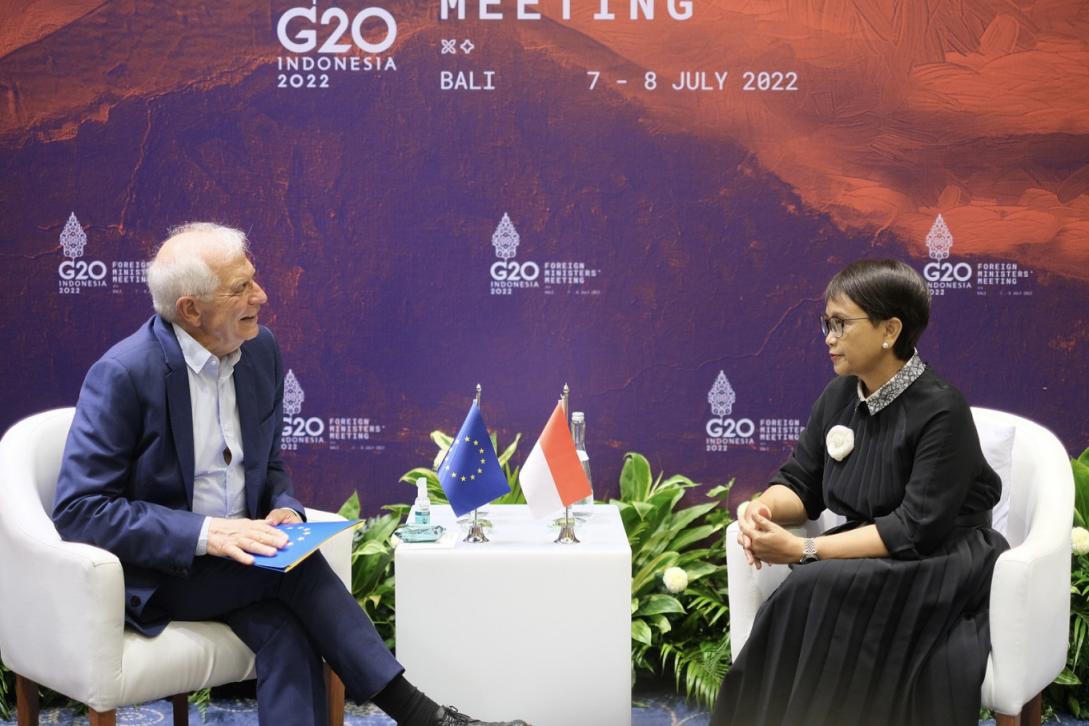The Jakarta Post - Discourse: Strengthening multilateralism, finding solutions at G20 FMM

One of the confirmed participants to the FMM, Josep Borrel, the High Representative of the European Union for Foreign Affairs and Security Policy, spoke to The Jakarta Post’s M. Ibnu Aqil about strengthening multilateralism and address the strategic aspects of global recovery efforts.
Following is an excerpt from the interview.
How does the EU relate to the Indonesian G20’s three priority issues, global health architecture, sustainable energy transition and digital transformation?
Indonesia’s G20 priority issues coincide with the EU’s own priorities. and we can only address these issues together. The G20 constitutes, in that sense, a crucial platform. It is [common sense], indeed, but we need a global response to global problems.
Unfortunately, the multilateral system today is under pressure like never before, it is put to a severe test, and we are seeing an aggravation of the “deficit in multilateralism”. We see more distrust, more nationalism and more free riding than the world can afford.
In our globalized world, we all suffer from the non-provision of public goods, and the majority of problems that our societies face can only be solved on a global scale, by working together.
I hope our meeting here can contribute to overcome national considerations and ideologies, even though the context and recent developments are not good at all.
How do you view Indonesia’s G20 presidency so far, with the war in Ukraine continuing and Jakarta working hard to get G20 leaders to commit to the agenda?
Indonesia’s G20 presidency came at a difficult time in the aftermath of the COVID-19 pandemic, and rightly focused its agenda on the recovery. The Russian war of aggression against Ukraine of course made things worse, sent shockwaves around the world and toppled the agenda. The unprovoked attack of a sovereign neighbor bulldozed away international law and aggravated the food and energy crises we now face.
Indonesia has reacted to this new reality and aims at tackling the consequences of the war with multilateral cooperation, which – as said – has become today a clear challenge. Apart from the war against Ukraine, it is important that the [G20] presidency continues addressing issues that have not disappeared and of course threaten our world, such as climate change or global health issues.
Indonesia has our full support for its G20 agenda and we will continue to cooperate closely. Multilateralism must work, even in times of crisis, and we intend to prove this.
A few weeks ago, the United States and several allies suggested that they would not be comfortable with Russian presence at G20 meetings, specifically the Bali summit. What is the EU view? Can G20 discussions on priority issues remain productive under the current circumstances?
The Russian leadership is doing a lot to destroy the multilateral system and rules-based order, but we will not let them do this and paralyze the entire G20. Putin’s appalling war excludes “business as usual”, and we refute the Kremlin’s disinformation narratives and its attempts to use the G20 as a propaganda platform.
The G20 is too important for us, developing and emerging countries and global stability, and we do not want it to be broken by Putin.
At the G20, we will face the Russian leadership and tell them to their face what they know they are doing. We welcome that Indonesia has invited Ukrainian Foreign Minister [Dmytro] Kuleba, who will attend this meeting virtually.
President Joko Widodo visited Kyiv and Moscow to meet with the leaders of the warring countries, urging them to sit down and talk and warning them of the global economic impacts of the conflict. What is the EU’s view on this approach, and what role does the EU expect Indonesia to take to bring an end to the war in Ukraine?
This is a “man-made” crisis. The name of the man is Putin, and only he can end this. The solution is clear: Putin should immediately put an end to Russia’s aggression against Ukraine and withdraw all troops.
Threats to food and energy security, an important direct consequence of the Russian invasion, feature prominently on the agenda of the G20 Foreign Ministers’ Meeting.
We can only address these issues together and welcome all our partners’ efforts to help ending this war and bringing the Russian leadership to reason.
The energy transition is becoming more important than ever, both as part of Indonesia’s G20 agenda and because of the energy crisis unfolding due to the Ukraine war. How is the EU dealing with this problem at home while supporting global initiatives through the G20?
The EU already decided to get rid of fossil fuels some years ago, but we have to admit that our dependency on Russian fossil fuels has even increased with time. However, Putin’s war has accelerated our efforts to achieve the green transition to renewable clean energies, and we are speeding up our energy transition to phase out the use of fossil fuels.
The war has also made it clear that we cannot rely only on one supplier who does not hesitate to use natural resources as a geopolitical weapon, explicitly threatens partners with it and is selectively reducing supplies.
We are working to reduce our energy dependence on Russia, and have in the last weeks banned the imports of Russian coal and oil and are reducing ever more our gas imports. And of course, less dependency means less money for the Kremlin’s war chest.
At the same time, we should also keep in mind those countries that are most hit by the current energy crisis caused by Russia’s invasion, including least developed countries and small island developing states. Multilateralism needs to be here to offer them solutions, and the G20 is a platform we should use to ensure it.
Link to Interview published on The Jakarta Post
